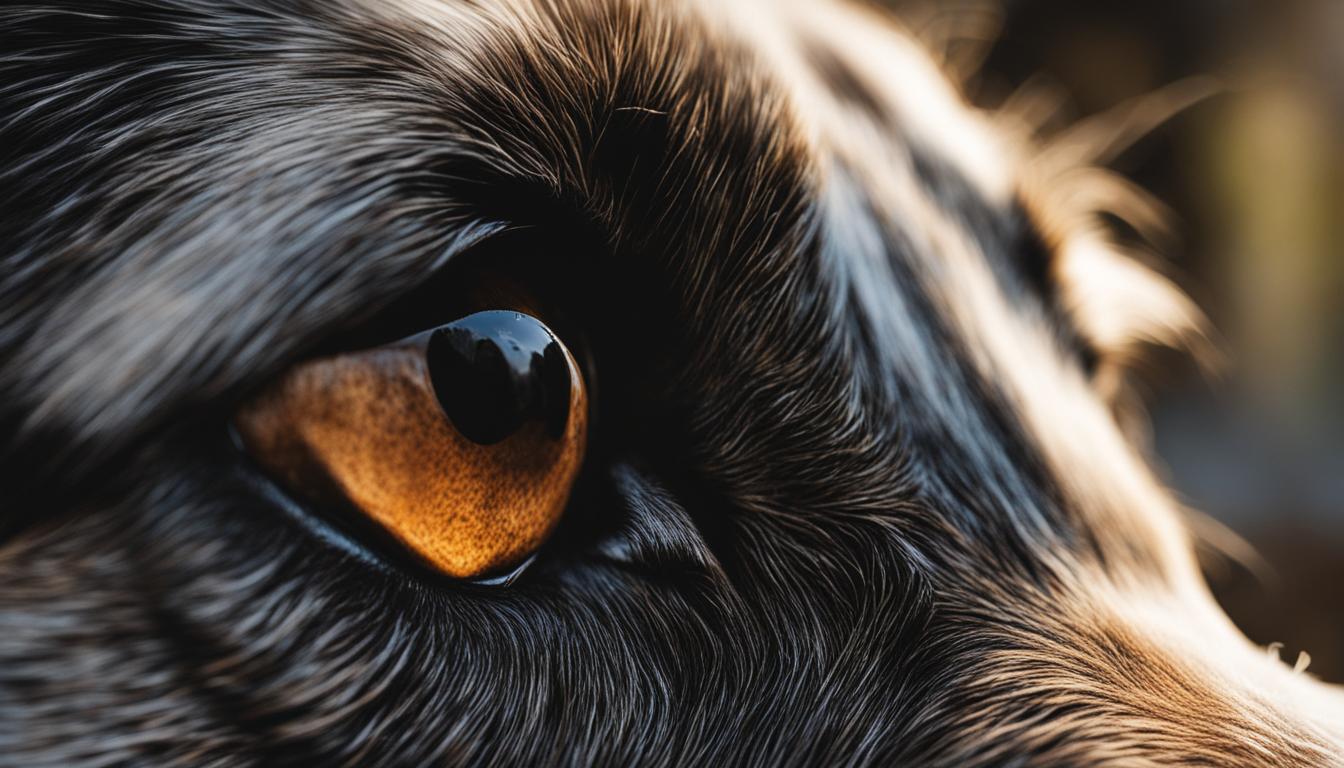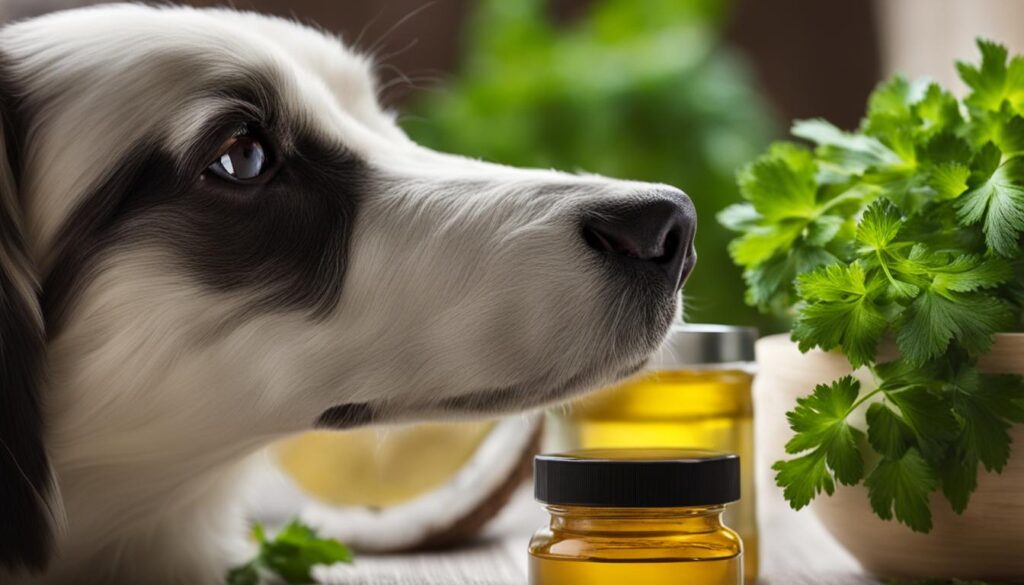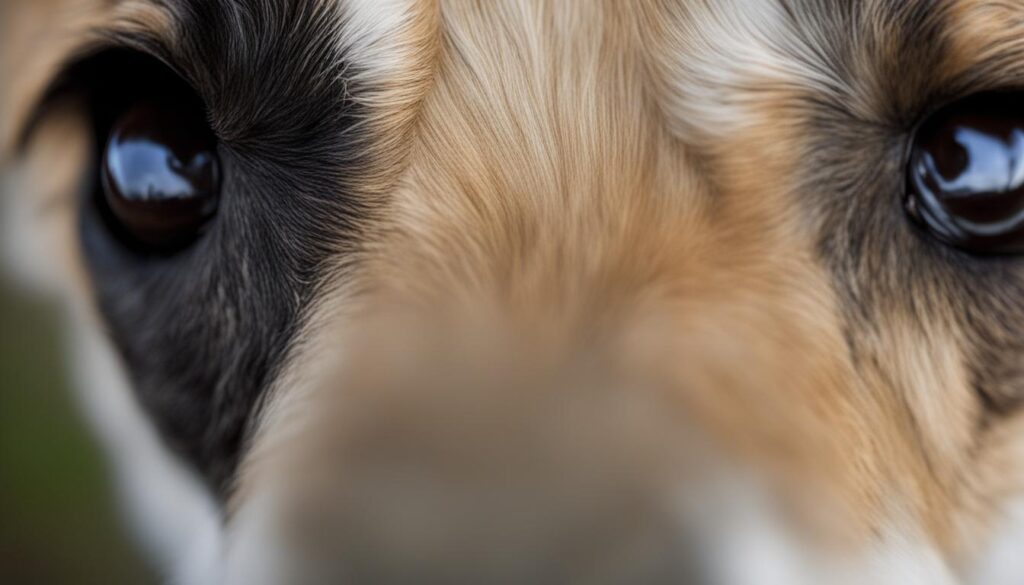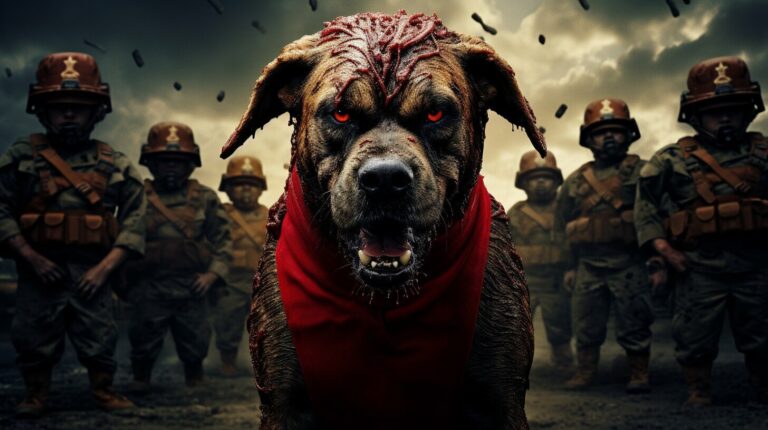Understanding Why is My Dog’s Nose Dry – A Friendly Guide
Many dog owners wonder why their furry friend’s nose is dry and what it might mean for their health. In this friendly guide, I will help you understand the reasons behind a dry dog nose and when you should be concerned.
It is important to note that a wet nose is not always a sign of good health, nor does a dry nose always indicate a problem. A dog’s nose can naturally vary in wetness depending on various factors.
So, let’s dive into the topic of dry dog noses and explore the different causes and normal reasons behind this phenomenon.
Key Takeaways:
- A dry nose in dogs can have several normal explanations and is not always a cause for concern.
- Factors such as napping, dehydration, exposure to the elements, and age can contribute to a dog’s nose being dry.
- It is important to monitor for accompanying symptoms and consult a veterinarian if necessary.
- Regular hydration, moisturizing balms, and sunscreen can help prevent and manage dry noses in dogs.
- Persistently dry noses and certain symptoms may require veterinary attention for proper diagnosis and treatment.
How a Dog’s Nose Stays Wet
A dog’s nose stays wet through a combination of mucus production and regular licking. Special mucus-producing glands in the lining of the dog’s nose keep it moist, while licking serves to both keep the nose wet and allow the dog to interpret smells through taste. A wet nose is crucial for a dog’s sense of smell, as it helps to trap scent particles and enhance their ability to detect odors. Dogs’ noses also sweat, helping them regulate their body temperature.
The mucus glands in a dog’s nose play a vital role in keeping it wet. These glands produce a thin layer of mucus that coats the surface of the nose, preventing it from drying out. The mucus not only helps to maintain the wetness of the nose but also acts as a sticky trap for scent particles in the air. When a dog sniffs, the scent particles stick to the mucus, allowing them to be detected by the dog’s olfactory receptors.
“A dog’s wet nose is like a built-in scent catcher. The mucus on their nose helps them capture and analyze smells more effectively,” says Dr. Emily Thompson, a veterinarian specializing in animal behavior.
In addition to mucus production, dogs also lick their noses to keep them wet. When a dog licks its nose, the saliva moistens the surface, providing additional moisture and aiding in the detection of scents. Licking also allows dogs to transfer scent molecules from their nose to their taste buds, which are located on the roof of their mouth. This helps them gather even more information about the smells they encounter.
The combination of mucus production and licking ensures that a dog’s nose remains wet, enabling them to rely on their incredible sense of smell. It’s important to note that a wet nose is not necessarily a sign of illness but rather a natural physiological function of a dog’s nose.
Normal Reasons for a Dry Nose
A dog’s nose can become dry for various normal reasons. One common cause is when a dog is sleeping. During sleep, dogs do not typically lick their noses, so it may be dry upon waking.
In addition, weather conditions can contribute to a dry nose. In the winter, cold air and indoor heating can dry out a dog’s nose. This is more noticeable in drier climates or during prolonged exposure to these conditions.
As dogs age, their noses may naturally become drier. Older dogs may experience decreased mucus production, leading to a dry nose. Similarly, certain breeds, like brachycephalic breeds (such as Pugs and Bulldogs), often have difficulty licking their noses due to their unique facial structures, which can result in dryness.
Dry Nose in Older Dogs
As dogs age, their bodies undergo various changes, and their noses are no exception. Older dogs may experience a decrease in mucus production, leading to dryness. This is considered a normal part of the aging process and typically does not cause any serious health concerns. However, it is still important to monitor your older dog’s overall well-being and consult a veterinarian if you notice any significant changes or accompanying symptoms.
Dry Nose in Brachycephalic Breeds
Brachycephalic breeds, such as Pugs and Bulldogs, are known for their unique facial structures, which can contribute to dryness in their noses. These breeds often have shorter muzzles, flattened faces, and elongated palates, making it more challenging for them to lick their noses. As a result, their noses may be drier compared to other breeds. While this dryness is typically not a cause for concern, it’s still essential to monitor your dog’s nose for any signs of excessive dryness, cracking, or discomfort.
Dry Nose While Sleeping
It is normal for a dog’s nose to be dry while they are sleeping. During sleep, dogs do not engage in activities like licking their noses, which helps to keep the nose moist. As a result, the nose may appear dry upon waking. However, once the dog is awake and active, their nose should regain its natural moisture through licking and mucus production.
Potential Causes of a Dry Nose
While a dry nose in dogs can have normal explanations, it can also be caused by various factors. Understanding these potential causes can help pet owners identify when further action may be needed:
Allergies
Allergies can contribute to a dry nose in dogs. Just like humans, dogs can be allergic to certain substances in their environment, such as pollen, dust mites, or certain foods. These allergies can cause inflammation and irritation, leading to dryness in the nose and other symptoms like itching, sneezing, and skin reactions. If you suspect your dog has allergies, consult with a veterinarian for proper diagnosis and management.
Dehydration
Dehydration is another common cause of a dry nose in dogs. When a dog does not have enough water intake or is losing excessive fluids due to hot weather or strenuous exercise, dehydration can occur. This can lead to dryness in the nose, as well as other signs such as lethargy, sunken eyes, and loss of skin elasticity. Providing access to fresh water and ensuring proper hydration can help prevent and resolve dehydration-related dry nose.
Sunburn
Just like humans, dogs can get sunburned, especially those with pale or thin noses. Prolonged exposure to the sun’s UV rays can cause the skin on the nose to become dry, cracked, and painful. Using a dog-safe sunscreen on your furry friend’s nose can help protect it from harmful UV rays and prevent sunburn. Consult with your veterinarian to find a suitable sunscreen product for your dog.
Autoimmune Diseases
Autoimmune diseases, such as discoid lupus erythematosus and pemphigus, can lead to dryness, crusting, or cracking of the nose in dogs. These conditions occur when the immune system mistakenly attacks healthy tissues, including the skin on the nose. If you notice persistent dryness or other changes in your dog’s nose, it is essential to consult with a veterinarian for proper diagnosis and treatment.
By understanding the potential causes of a dry nose in dogs, pet owners can better identify when further investigation or veterinary consultation may be necessary. Allergies, dehydration, sunburn, and autoimmune diseases are some of the common factors that can contribute to dryness in a dog’s nose. If your dog’s dry nose persists or is accompanied by other concerning symptoms, seeking professional advice is recommended for proper evaluation and appropriate management.
Dry Nose in Dogs: When to Be Concerned
A dry nose in dogs can be a normal occurrence, but it’s important to recognize when it may indicate a more serious underlying condition. While a dry nose on its own is not always a cause for concern, it’s essential to monitor for other symptoms that may accompany it. These symptoms could include fever, dehydration, and autoimmune diseases.
If you notice that your dog’s dry nose is accompanied by lethargy, changes in activity or appetite, or pale gums, it may be a sign of a more serious issue. In these cases, it is crucial to consult with a veterinarian to determine the cause and appropriate course of action.
Additionally, certain conditions such as discoid lupus erythematosus and pemphigus can cause a dry, crusty, or cracked nose. These autoimmune diseases require medical attention and should be evaluated by a veterinarian.
In summary, while a dry nose in dogs can be a normal occurrence, it’s important to pay attention to accompanying symptoms that may indicate a more serious underlying condition. Regular veterinary check-ups and open communication with your veterinarian are crucial for maintaining your dog’s overall health and addressing any concerns.
| Signs to Watch for: | Possible Causes: |
|---|---|
| Lethargy, changes in activity or appetite | Underlying illness or condition |
| Pale gums | Anemia or inadequate oxygenation |
| Fever | Infection or inflammation |
| Dehydration | Lack of fluids or excessive fluid loss |
| Autoimmune disease | Abnormal immune response |
Dry Nose Remedies and Prevention
If your dog has a dry nose, there are several remedies and preventive measures you can take to keep their nose moisturized and healthy. Here are some effective options:
1. Moisturizing Balms for Dog Noses
Using a moisturizing balm specifically designed for dog noses can help keep the skin hydrated and prevent dryness. These balms typically contain nourishing ingredients such as shea butter, coconut oil, or beeswax. Gently apply the balm to your dog’s nose, paying attention to any dry or cracked areas. Regular application can help soften and soothe the nose, providing relief from dryness.
2. Sunscreen for Dog Noses
Just like humans, dogs can get sunburned, especially on their noses. To protect your dog’s nose from harmful UV rays, apply a dog-safe sunscreen. Look for a sunscreen specifically formulated for dogs, as human sunscreens may contain ingredients that are toxic to pets. Apply the sunscreen to your dog’s nose before going outside, especially during peak sun hours. This can help prevent sunburn and keep the nose moisturized.
3. Preventing Dry Dog Nose
Preventing dry noses in dogs involves taking proactive measures to keep their skin hydrated. Ensure your dog has access to fresh water at all times to prevent dehydration. Hydration is key to maintaining overall skin health, including the nose. Additionally, avoid excessive exposure to harsh weather conditions, such as extreme cold or hot temperatures, as these can dry out the nose. Using a humidifier in dry indoor environments can also help maintain moisture levels in the air, benefiting your dog’s nose.
By incorporating these remedies and preventive measures into your dog’s routine, you can help keep their nose moisturized and prevent dryness. However, it’s important to note that persistent dryness, especially when accompanied by other symptoms, may require veterinary evaluation. If you have any concerns about your dog’s nose health, it’s always best to consult with a veterinarian for proper diagnosis and treatment.
Persistent Dry Nose and Veterinary Consultation
A persistently dry nose in dogs can sometimes be a cause for concern and may require veterinary evaluation. One potential condition that can lead to persistent dryness and a crusty nose is nasal hyperkeratosis. This condition is characterized by excessive growth of nose tissue, which can result in dryness, cracking, and a hardened appearance. If you notice these symptoms in your dog’s nose, it is important to consult with a veterinarian for proper diagnosis and treatment.
In addition to nasal hyperkeratosis, certain autoimmune diseases can also cause changes to the nose, including dryness. Diseases such as discoid lupus erythematosus and pemphigus can result in a dry, crusty, or cracked nose. If you suspect that your dog may have an autoimmune condition, it is crucial to seek veterinary guidance to manage the disease effectively and alleviate any discomfort your dog may be experiencing.
It’s also worth considering the possibility of medication side effects contributing to a dry nose. Some medications may have dry nose as a known side effect. If your dog is taking any medications and you notice persistent dryness in their nose, it’s important to discuss this with your veterinarian. They can provide guidance on whether the medication may be causing the dryness and explore potential alternative options if necessary.
Table: Common Causes of Persistent Dry Nose in Dogs
| Cause | Description |
|---|---|
| Nasal Hyperkeratosis | Excessive growth of nose tissue leading to dryness, cracking, and a hardened appearance |
| Autoimmune Diseases | Conditions such as discoid lupus erythematosus and pemphigus can cause dry, crusty, or cracked nose |
| Medication Side Effects | Some medications may have dry nose as a known side effect |
If your dog has a persistently dry nose, especially when accompanied by other concerning symptoms, it is advisable to consult with your veterinarian. They will be able to evaluate your dog’s overall health, conduct any necessary tests or examinations, and provide appropriate treatment recommendations to address the underlying cause of the dry nose and improve your dog’s well-being.
Signs that Warrant a Vet Visit
If your dog has a dry nose, it is important to monitor for certain signs that may indicate the need for a veterinary visit. While a dry nose on its own may not be a cause for alarm, these accompanying symptoms should not be ignored:
- Severe dehydration: If your dog’s dry nose is accompanied by excessive thirst, sunken eyes, lethargy, or loss of appetite, it may indicate severe dehydration. Dehydration can be serious and requires immediate veterinary attention.
- Bleeding or peeling nose: If your dog’s nose is bleeding, peeling, or has sores, it may be a sign of an underlying condition that needs to be investigated by a veterinarian.
- Nasal discharge: If your dog has a dry nose and is experiencing nasal discharge that is yellow, green, or bloody, it could indicate an infection or other respiratory issue that requires veterinary evaluation.
- Excessive sneezing: If your dog is constantly sneezing and has a dry nose, it may be a sign of allergies, respiratory problems, or foreign objects in the nasal passages. A vet visit is recommended to determine the cause.
- Change in nose color: If your dog’s nose changes color, such as becoming pale, red, or blue, it may indicate a lack of oxygen, poor circulation, or an underlying health issue. Prompt veterinary attention is necessary to determine the cause.
If your dog exhibits any of these signs along with a dry nose, it is crucial to consult with a veterinarian for proper diagnosis and treatment. Remember, early detection and intervention can greatly improve your dog’s health and well-being.
Table: Signs that Warrant a Vet Visit for Dry Dog Nose
| Signs | Possible Causes |
|---|---|
| Severe dehydration | Lack of water intake, excessive heat, illness |
| Bleeding or peeling nose | Injury, infection, autoimmune disease |
| Nasal discharge | Infection, respiratory issue |
| Excessive sneezing | Allergies, respiratory problems, foreign objects |
| Change in nose color | Lack of oxygen, poor circulation, underlying health issue |
Table: Signs that warrant a vet visit for dry dog nose, along with possible causes.
Taking Care of Your Dog’s Nose
When it comes to taking care of your dog’s nose, there are several important factors to consider. Proper hydration is crucial for maintaining a healthy nose, as well as overall well-being. Make sure your dog has access to plenty of fresh water throughout the day, especially during warmer periods or after physical activity. Hydration helps keep the nose moist and prevents it from drying out.
Another essential aspect of nose care is protecting it from the sun’s harmful rays. Just like humans, dogs can get sunburned, particularly those with light or thin noses. To safeguard your furry friend, use dog-safe sunscreen specifically formulated for dogs. Apply it generously to your dog’s nose before heading outdoors, especially during peak hours of sun exposure.
Managing autoimmune diseases in dogs can be challenging, but it is vital for maintaining your dog’s nose health. Work closely with your veterinarian to develop a treatment plan that may include medications and lifestyle adjustments. By following your vet’s guidance and providing the necessary care, you can help alleviate symptoms and minimize dryness.
In cases of dry nose or in breeds prone to nasal hyperkeratosis, the use of nose balms or moisturizers can be beneficial. These products help soften and soothe the nose, providing relief from dryness. Regularly applying a dog-friendly nose balm can help keep your dog’s nose moisturized and prevent excessive dryness and cracking.
Conclusion
In conclusion, a dry nose in dogs can have several normal explanations and is not always indicative of illness. It’s important to remember that a wet nose is not always a sign of a healthy dog, and a dry nose does not automatically mean something is wrong. Factors such as napping, exposure to the elements, dehydration, and age can cause a dog’s nose to be dry.
However, if your dog’s dry nose is persistent or accompanied by other concerning symptoms, it is best to consult with a veterinarian. They can evaluate your dog’s overall health and determine if further investigation or treatment is necessary.
As a responsible pet parent, there are some remedies you can try to help alleviate dryness in your dog’s nose. Providing access to fresh water and ensuring your dog is adequately hydrated is important. You can also use moisturizing balms or lotions specifically formulated for dogs to help keep their nose moist. Additionally, taking precautions to protect your dog’s nose from sunburn and extreme weather conditions can help prevent dryness.
Regular veterinary check-ups are crucial for maintaining your dog’s overall health and well-being. Your veterinarian can provide guidance on how to properly care for your dog’s nose and address any concerns you may have. Remember, you know your dog best, so if something doesn’t seem right, it’s always better to be safe and seek professional advice.
FAQ
Why is my dog’s nose dry?
There are several normal reasons for a dog’s nose to be dry, such as napping, dehydration from exercise, exposure to the elements, and age. However, a dry nose can also be a sign of illness, so it’s important to monitor for other symptoms.
How does a dog’s nose stay wet?
A dog’s nose stays wet through a combination of mucus production and regular licking. Special mucus-producing glands in the lining of the dog’s nose keep it moist, while licking serves to both keep the nose wet and allow the dog to interpret smells through taste.
What are some normal reasons for a dry nose in dogs?
A dog’s nose can be dry after napping, due to exposure to the elements, dehydration from exercise, or as they age. Brachycephalic breeds may have difficulty licking their noses, leading to dryness.
What are potential causes of a dry nose in dogs?
Dehydration, allergies, sunburn, and autoimmune diseases can all cause a dry nose in dogs.
When should I be concerned about my dog’s dry nose?
If a dry nose is accompanied by symptoms such as lethargy, vomiting or diarrhea, changes in activity or appetite, or pale or bright red-purple gums, it may indicate a more serious underlying condition. Fever, dehydration, and certain autoimmune diseases can also cause a dry nose and should be evaluated by a veterinarian.
How can I remedy and prevent a dry nose in my dog?
Offering water, using moisturizing balms or lotions, and taking precautions to protect your dog’s nose from sunburn and environmental factors can help remedy and prevent a dry nose. Regular veterinary check-ups are also important for maintaining your dog’s overall health.
When should I consult a veterinarian for my dog’s dry nose?
If your dog’s nose is persistently dry or accompanied by symptoms such as crusting, bleeding, nasal discharge, excessive sneezing, or changes in nose color, it’s best to consult a veterinarian for further evaluation.
What are signs that warrant a vet visit for a dry nose?
Signs such as severe dehydration, bleeding or peeling nose, nasal discharge, excessive sneezing, and changes in nose color are all indications that a vet visit is necessary to address the underlying health issue.
How can I take care of my dog’s nose?
Ensuring your dog has access to plenty of fresh water, using dog-safe sunscreen to protect their nose from sunburn, and working closely with your veterinarian to manage any autoimmune diseases are all ways to take care of your dog’s nose. Regular application of nose balms or moisturizers can also help soften and soothe dry noses.
Do I always need to consult a vet for a dry nose?
While occasional dryness is usually not a cause for concern, a persistently dry nose or accompanying symptoms may require veterinary evaluation. It’s important to monitor your dog’s overall health and address any concerns with a professional.
Source Links
- https://www.akc.org/expert-advice/health/why-is-my-dogs-nose-dry/
- https://www.sidewalkdog.com/why-dogs-nose-is-dry/
- https://toegrips.com/why-is-my-dogs-nose-dry/
I’m Cathy Berger, a proud author for News Mag. As an avid trend enthusiast, I share the pulse of all things homes, family, entertainment, tech, and gaming. From the cozy comfort of your living room to the thrilling world of virtual reality, I’ve got it covered. Join me in exploring the latest trends in interior design, gardening tips, movie reviews, celebrity news, gadget releases, and gaming updates. With News Mag, I’ll keep you informed and entertained, delivering the hottest and most exciting stories right to your screen. Stay in the know and never miss a beat with my insider knowledge on what’s trending.








